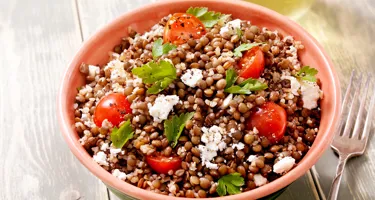
Boosting your protein intake can help you to reach your wellness goals. Check out the top 10 tips that nutritionist Sophie Bertrand shared with Arla skyr.
Protein, primarily found in meat products, is essential for the building and maintenance of muscle mass. In fitness terms, it has witnessed an increase in attention in recent years as its impact is more widely recognised, linked to the maintenance of normal bones and muscle mass. Good sources of proteins include meat, fish, eggs, dairy products (such as natural yogurt), soy, quinoa and legumes.
The ideal amount of protein for any one individual depends on a variety of factors, including age, activity levels and health status. If you have a physically demanding job or are particularly active every day, your body may require more protein than the daily recommendation. Additionally, the elderly can benefit from high protein foods as their appetite can decline and therefore protein intake may reduce as a result.
If you’re eating a well-balanced diet that includes plenty of variety, it’s likely you’re already eating enough protein. However, if you lead an active lifestyle or feel you might not quite be getting enough protein in your diet, you may want a boost to help reach your wellness goals, here are a few of my top tips for increasing your protein intake.
1. Snack on protein-based snacks
If you lead a busy or on-the-go lifestyle, it is likely that you may need to snack in between meals. Snacks that contain protein can be a great choice.
2. Have eggs for breakfast

Scrambled egg on wholegrain toast
Eggs can be a delicious way to start the day and they contain a complete amino acid profile as well as a variety of other nutrients. There are also so many ways you can enjoy them… poached, fried, scrambled, as omelette or in pancakes – so they’ll never get boring.
3. Add nuts and seeds to your food as a topping
Nuts and seeds are nutrient dense foods that also contain protein. They are an easy addition to any meal and will add extra taste and texture to your food!
4. Snack on yogurts that contain protein

Fruit and yogurt makes a tasty and nutritious snack
Most yogurts are delicious, but some contain significantly more protein than others. If you are consciously trying to up your protein intake, specific yogurts such as Greek and skyr, are good sources of protein and you can also add nuts and berries to make for a tasty and nutritious snack.
5. Make sure you have a protein food at each meal
It sounds like an obvious thing to say but some people may not eat enough protein at each meal. For example, if you are someone who loves cereal or buttered toast for breakfast, there is very little protein in these dishes. To help increase your protein intake, try and have a portion of protein at each meal.
6. Add nut butter to fruit
Nut butters and fruits are personally, my favourite snacks! As well as containing essential fats, nut butters are a source of protein and make for a delightful snack when paired with fruits such as banana, apples, pears or blueberries.
7. Snack on chickpeas
Cheap, nutritious and super easy to take on the go! You can roast chickpeas in the oven and mix them in with a range of different spices, before storing them in your fridge as a go-to snack.
8. Add lentils to your salad
Lentils are a source of plant proteins and are extremely easy to add to most dishes! Salads in particular often lack protein, so lentils are a great addition that’s easy to implement.
9. Have a cheesy snack
Snacking is a great way to include more protein in your diet and a portion of cheddar cheese contains around 7-9g of protein, as well as being a great source of calcium.
10. Consider a protein shake
If you still find it difficult to include more protein-rich foods in your diet, protein shakes can be a really convenient option. You can also buy it in already portioned out sachets that you can mix up on the go for an easy solution for increasing your protein intake!
Sophie is Registered Associate Nutritionist (ANutr) with a BSc Psychology degree, an MSc in Clinical Nutrition and is the founder of Sophie’s Healthy Kitchen. She has also obtained a diploma in Nutritional Interventions for Eating Disorders accredited by the British Psychological Society (BPS) and an additional diploma in Intuitive Eating.
Sophie has worked with leading brands in the food industry and also works with clients in a 1-1 setting at the Rhitrition clinic on Harley St.
Sophie uses her Instagram page @sophieshealthykitchen to share evidence-based nutrition and simple recipes that can easily replicated by her audience.
